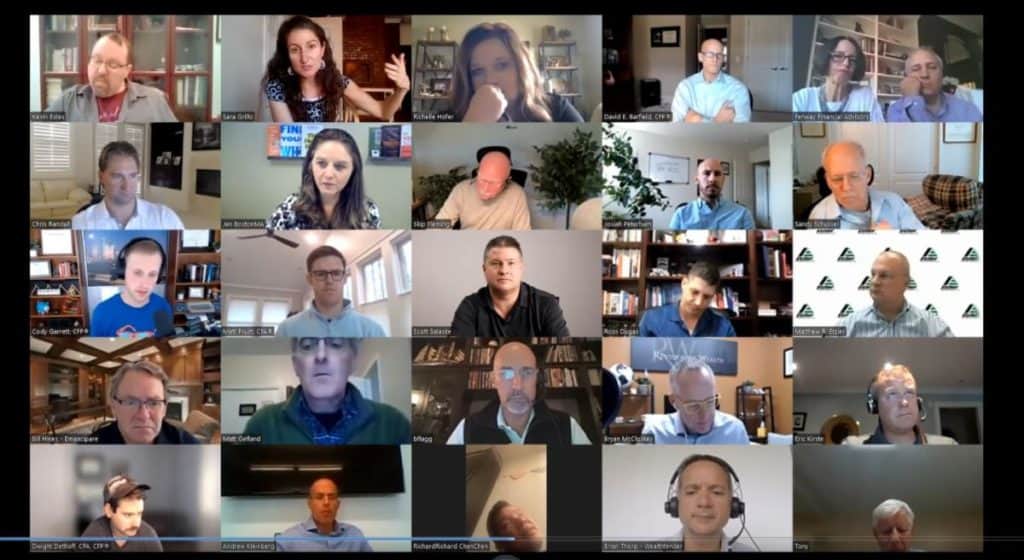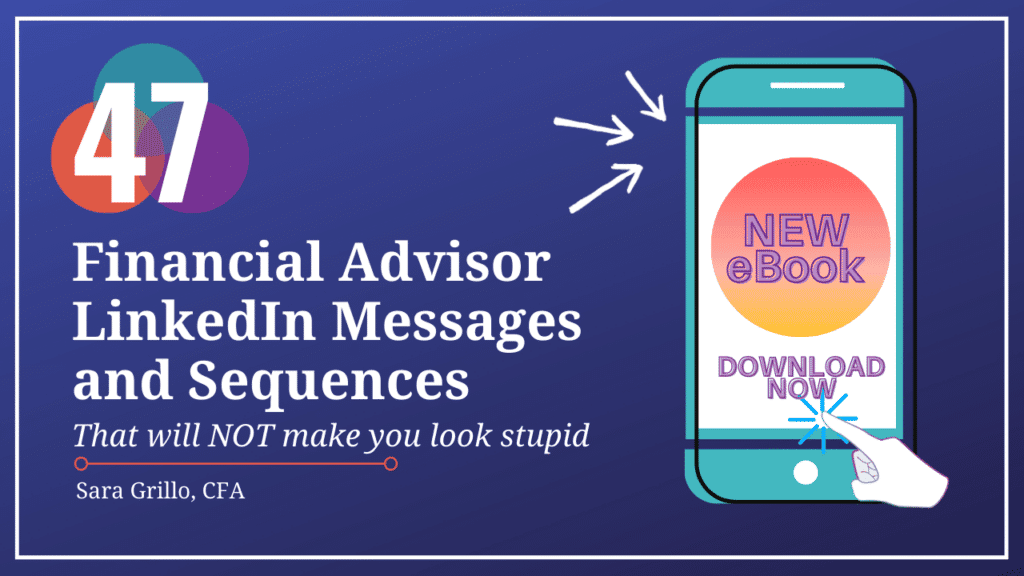Podcast: Play in new window | Download
It seems like everyone from the Senate Banking Committee to Reddit forums, everyone is buzzing about crypto this and crypto that. Today we’re gonna WAKA WAKA BREAK IT DOWN to the question, “Is crypto a good investment or is it as valueless as a rock?” and you can bet that this is going to be a live one!
For those of you who are new to my blog/podcast, my name is Sara. I am a CFA® charterholder and I used to be a financial advisor. I have a weekly newsletter in which I talk about financial advisor lead generation topics which is best described as “fun and irreverent.” So please subscribe!

We’ve got a great party crew here today.
On the “For” crypto side:
Robert Wright, Financial Planning Professional at Advocacy Wealth
James Giles , crypto product manager at Nerd United, a venture studio that works with seed and pre-seed crypto start ups
Dr. Steven Lee, Lecturer at California State Polytechnic University-Pomona
Against crypto:
Scott Salaske, my ride or die homeboy,
And me, I’ll try to stay neutral but I’ll tell you that I’m not crypto fan.
And let’s get on with it!
Is cryptocurrency a currency or a commodity?
Opinions were:
Lee: You can actually be a vendor of any kind accepting cryptocurrency, as long as you go through the formalities. As long as that is true he has a hard time accepting that it could be a security, and he sees it as a medium of exchange.
Salaske: It’s not a security or a currency either. There is no underlying asset that drives the value. It’s not a currency because it’s not pegged to an underlying currency and if it were, you would just buy the underlying currency. It’s just the enthusiasts who are enthusiastic about it, not the average person.
“It’s just basically nothing.”
-Scott Salaske
Giles: There are different factions within crypto. With Bitcoin, some people buy it for speculative reasons. It may be better to look at it like precious metals almost like a commodity. We’d have to discuss on a case by case basis.
Giles asks, what do you say about the US dollar if you think crypto is “nothing” – (to quote Salaske).
Is crypto a good investment, or does it suck?
Salaske: It sucks
What’s the point of it? It’s not an asset so why would you hold it? It’s not a currency but why would anybody want to transact in it on a day to day basis. Maybe Stablecoins will develop. But to own crypto…
Wright: Is gold an asset?
Salaske: No, I don’t buy gold. It’s a rock.
“Any metals or anything else. It’s a rock. Use them as a doorstep. They keep up with inflation over time. That’s it.”
-Scott Salaske
Salaske says that it would be have to have a growth driver or utility, or else it would be like picking up a rock and putting it into your portfolio.
Wright: So if gold is something a client could be invested in and potentially suitably recommended by an advisor, what is the argument against Bitcoin?
Wright argues that we could diminish any asset that way, even stock certificates. Gold has transaction value. All value is relative. It is what one person determines with another person engaging in a market. Now we have a version of gold that doesn’t have the problems that gold does. It won’t cost alot of fuel to transact and settle transactions. Bitcoin can act in that matter. How can you say it doesn’t have utility value?
Lee: Would you be saying the same thing about gold if we rewound the clocks and went back to the Gold Standard?
Salaske rebuts back that gold had a value at that time and it could be used for something. There is a lack of substance backing crypto.
How should crypto be regulated?
Wright: There is a common misconception that crypto isn’t regulated. That’s false. Gary Gensler has stated that there is nothing different about crypto under the Securities Act. If it’s not regulated then why are people being prosecuted? Kardashian, etc.
I’d say they prefer ambiguity. The reason is that it allows them to prosecute people based on that ambiguity. Because if they came out and just said, “Hey, it’s exactly the same. There’s no difference. We have to follow the Securities Act [of 1933]. But they benefit from the ambiguity.
They prefer to be able to put the gun in the ribs vs. having some clear way that people can operate around these [cryptocurrencies.]
-Robert Wright, CFP
Lee: The list of things Gary Gensler doesn’t own is probably very short.
Wright: I would prefer they didn’t regulate, and how would they even regulate it other than love notes in the air?
Grillo: So how do we stop the massive collapses like FTX?
Giles: If the SEC could get its act together, it would prevent crypto from being driven offshore.
Wright: We should separate custody from the ability to provide investment advice on those assets. This would decrease the potential for conflicts of interest. FTX custodied everyone’s assets. That is how they were able to pull that off. They said, you have to exchange your dollars for our tokens to be able to trade on our exchange.
Lee: That’s the first thing the fraud examiners say. If you don’t want fraud to go on, you have to separate out all the responsibilities.
Is crypto a real innovation?
Our payment structure has not been innovated in nearly 50 years.
-James Giles
Lee: I would be a fan of separating out blockchain technology from cryptocurrency. I don’t want to trash Central Banking, but now that we have blockchain technology we could replace it. When you look at the individual person, it’s not helpful when Visa or Mastercard says we sent you the money, it’s going to be 2-3 business days before you receive it. Blockchain would make it quicker. That is a huge area of potential. I would like to see us move off of Central Banking. Having 12 districts is not decentralized. It’s not decentralized. With blockchain we could do that. We could do that with Fiat currencies and not necessarily crypto. I’m fine with jettisoning the coins.
We need to do something with this Central Banking nonsense. It’s outlived its usefulness.
– Dr. Steven Lee
Wright: Dr. Lee is arguing that we need sovereign money. If you have the wrong political views, access to your bank account could be at risk. That’s crazy. I would argue that bitcoin is a huge part of that blockchain technology because you do need to have something you could exchange in value.
“Saying that one person can control bitcoin is like saying that one person can control the sun. It’s a completely decentralized project.”
– Robert Wright, CFP
For someone to be able to send payments overseas, bitcoin and cryptocurrencies help with that.
Grillo: But isn’t cryptocurrency the currency of choice for ransomware?
Wright: So is cash.
Grillo: But banks can’t custody dollars without following anti-money laundering standards.
Wright: It’s still illegal to launder money it’s that the regulators don’t have the capability to intercept.
Giles: Banks do have to follow rules and regulations. What we’ve seen in 2022 is that there were a number of hacks. Hackers take funds but they can’t offload it and exchange for fiat. It’s started to incentivize white hat hacking, where they return most of the funds back and keep the fee, because they can’t do anything with it.
How do we prevent the spread of misinformation about crypto?
Grillo: What do we do about all the malfeasances and endorsements that make crypto frauds worse?
Wright: This happens in pharma as well. I don’t know there is ever a capacity where you can eliminate that entirely. This is where advisors would do better if we are held to a clinical standard. We can assess the risk tolerance and help keep people out and hopefully people will listen to use instead of the celebrities.
In order to make this work, we have to figure out regulation and fraud. Those are the two main hurdles. –
Dr. Steven Lee
Lee: What are we going to do about Reddit? It’s a problem and it seems like the SEC is just picking and choosing who to go after. The problem exists with traditional assets. It comes down to financial literacy and investor education.
So is crypto a good investment or just a rock?
Did our debate inspire your thought to change?
I hope you’ll subscribe to my newsletter.
Join our next Transparent Advisor virtual meetup.

These meetups are free and the goal is to learn from each other about how to grow and manage a transparent practice for the benefit of clients.
Even if you can not make the meetup, or even attend in its entirety, please register for the replay and to be notified of the next one. We meet on the second Wednesday of the month at 1 PM ET.
Learn what to say to prospects on social media messenger apps without sounding like a washing machine salesperson. This e-book contains 47 financial advisor LinkedIn messages, sequences, and scripts, and they are all two sentences or less.

You could also consider my financial advisor social media membership which teaches financial advisors how to get new clients and leads from LinkedIn.

Thanks for reading. I hope you’ll at least join my weekly newsletter about financial advisor lead generation.
See you in the next one!
-Sara G
Biographies
Scott Salaske
Scott Salaske is the founder and CEO of Firstmetric, a flat fee financial advisor firm in Troy, Michigan. Ever since the beginning of his 20+ year long career, Scott has pursued his mission of delivering high quality financial advice in a low cost and unbiased way.
Early on in his entrepreneurial journey, Scott saw firsthand the inherent flaws and conflicts of interest in the traditional sales and product driven approach, as several family members had lost a significant portion of their hard-earned life savings to high-cost, commission-based investment products and inappropriate advice.
It was at that point Scott thought there had to be a better way for investors to obtain unbiased advice and low-cost access to the financial markets. That lead him to start Quest Asset Management, with the novel idea of putting investor interests first as a fiduciary, which was practically unheard of at the time. The idea centered on the concepts of simplicity, keeping total investment costs and taxes extremely low and developing a custom investment plan for each client using low-cost asset class and index funds.
A few years later Scott merged Quest with another local investment advisory firm, Portfolio Solutions, that shared the same investment principles at that time. Several years after the combined merger, Scott went on to grow the combined firm from advising approximately $60 million in client investment assets under management to more than $1.4 billion. In early 2015, Scott sold his ownership interest in the firm. He started Firstmetric a few years later.
At Firstmetric, Scott continues his mission of delivering low cost, unbiased advice to clients. Along his journey he has been quoted in the following publications: The Wall Street Journal, Investor’s Business Daily, Kiplinger’s Retirement Report, TheStreet.com, Cheddar.TV, Crain’s Detroit Business and MarketWatch.com; among others.
James Giles
James Giles works as a Product Manager specializing in the Fintech and Crypto space. Most recently James worked with several seed and pre-seed startups at Nerd United, a venture studio, specializing in working with Crypto Startups to identify their early product market fit and work to get them into a functioning BETA. His focus was to identify real-world applications and utility to the crypto space in areas such as payments, health care, eCommerce, charitable giving, and sales.
James completed both his Undergraduate and Master of Science Degrees at the University of Utah in Business Management and Information Systems specializing in Product Management. Prior to moving into Product Management James spent over 6 years with Fidelity Investments in various wealth management and technical roles where he held his FINRA Series 7 and 63 licenses and Utah Resident Life and Health Insurance License.
In addition to his professional endeavors, he volunteers his time mentoring those who want to break into the field of Product Management and works with a number of student blockchain organizations to educate as many as possible about the future crypto will have as a technology.
James is the father of three energetic boys and 1 Bernadoodle: Oliver, Henry, William, and Louie; and husband to Anya Giles since 2017. They love to travel, bake, and swim.
Robert Wright
Robert Wright, CFP® serves as a Financial Planning Professional at Advocacy Wealth Management with over 10 years of experience in the financial planning and services industry. Robert works families who are victims of wrongful death or personal injury to provide comprehensive settlement plans.
Robert completed His Undergraduate Degree at The University of Utah in Economics and his Master of Science in Advanced Personal Financial Planning and a graduate Certificate in Financial Therapy at Kansas State University.
In addition to his formal Education Robert Wright holds his FINRA Series 7 and 66 licenses, is a CERTIFIED FINANCIAL PLANNER™ Professional and holds Georgia Resident Life and Health Insurance License.
Robert is also an Instructor of CFP® Coursework for the College of Financial Planning Online and on Campus at Kennesaw State University.
Robert is the father of three amazing children: Macie, Liam, and Charlotte; and husband to Priscila Moraes-Wright since 2012. He and his family love to travel, play baseball, swim and play at the Georgia lakes and Beaches.
Dr. Steven Lee
Dr. Steven Lee is a lecturer in the Finance, Real Estate, and Law department at California State Polytechnic University, Pomona, Previously, he worked as an adjunct professor at California Lutheran University, and an instructor at the University of California Riverside Extension. Lee holds a Ph.D. in Financial and Retirement Income Planning from The American College of Financial Services, where he was named the Sievert-Sternberg Doctoral Research Fellow, and is currently pursuing a Doctor of Criminal Justice degree from Northcentral University. He has presented papers at conferences on topics such as investment fraud, risk management, and retirement planning. Additionally, Lee has received numerous awards, including the Outstanding Instructor Award and Excellence in Online Teaching Award from the University of California Riverside Extension, Best Paper Award in Risk Management & Insurance at the CFP Board Academic Research Colloquium, and is a member and fellow of the Sigma Beta Delta International Honor Society in Business. Dr. Lee’s current research agenda includes investigating the impact of insurance licensing on financial advisor misconduct, analyzing the effect of external vs. internal work commitments on college student performance in hybrid and online learning environments, and examining risk profiles of U.S. transgender male and female investors.
Disclosures
Grillo Investment Management, LLC does not guarantee any specific level of performance, the success of any strategy that Grillo Investment Management, LLC may use, or the success of any program. Nothing in these materials may be construed as an investment, insurance, or financial recommendation.
Grillo Investment Management, LLC will strive to maintain current information however it may become out of date. Grillo Investment Management, LLC is under no obligation to advise users of subsequent changes to statements or information contained herein. This information is general in nature; for specific advice applicable to your current situation please contact a consultant or advisor.
Podcast transcription and summary may differ from original recording and Grillo Investment Management, LLC may not be held liable for such differences.







